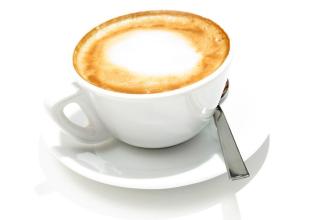Moderate alcohol Berman Manor in Kenya, the cultivation of boutique coffee beans, geographical location, climate, altitude is simple.

Kenyan coffee is mostly grown at an altitude of 1500m, 2100m, and is harvested twice a year. To ensure that only ripe berries are picked, people must tour the forest about seven times. Kenyan coffee is grown by small farmers. After they harvest the coffee, they first send the fresh coffee beans to the cooperative cleaning station. The washing station sends the dried coffee to the cooperative in the form of "parchment coffee beans" (that is, coffee beans covered with endocarp) to the cooperative ("parchment coffee beans" is the last state of coffee beans before peeling). All the coffee is collected together, and the growers charge the average price according to their actual quality. This trading method generally works well and is fair to both growers and consumers.
Kenyan coffee-status quo
Kenyan coffee beans the Kenyan government takes the coffee industry very seriously, where it is illegal to cut down or destroy coffee trees. Kenyan coffee buyers are world-class high-quality coffee buyers, and no other country can grow, produce and sell coffee on a continuous basis like Kenya. All coffee beans are first acquired by the Kenya Coffee Commission (CoffeeBoardofKenya, CBK), where they are identified, graded, and then sold at weekly auctions, where they are no longer graded. The Kenya Coffee Commission only acts as an agent to collect coffee samples and distribute them to buyers so that they can determine the price and quality. The auction in Nairobi is for private exporters, and the Kenya Coffee Commission pays growers a price below the market price. The best coffee grade is bean berry coffee (PB), followed by AA++, AA+, AA, AB and so on. The fine coffee is shiny, delicious and slightly alcoholic. Auctions are also organized to meet the needs of dispatchers. This kind of auction usually has a small auction volume (3-6 tons each), with samples with the grower's logo for buyers to enjoy. After the auction, the exporters pack according to different flavors, different qualities and the quantity required by the blenders. This provides a great deal of flexibility for the dispatcher. Quality-conscious Germans and Nordic people are long-term buyers of Kenyan coffee.
People in the coffee industry all think that Kenyan coffee is one of its favorite products because Kenyan coffee contains every feeling we want from a good cup of coffee. It has wonderful and satisfying aromas, well-balanced acidity, well-proportioned particles and excellent fruit flavors. The taste is so unique that there is almost no similar coffee. Kenyan coffee is characterized by a distinctive fruity aroma. Try to find this flavor in the coffee and pay attention to how it feels in the mouth. One of the common fruit aromas is citrus. Kenyan coffee has a multi-layered taste and the acidity of fruit juice, perfect grapefruit and wine flavor, medium mellow. Kenyan Coffee became more famous with the sensation of the Hollywood movie OutofAfrica.
It entered Kenya in the 19th century, when Ethiopian coffee drinks were imported into Kenya through southern Yemen. But it was not until the early 20th century that the Bourbon Coffee Tree was introduced by the St. Austen Mission (St.AustinMission). Kenyan coffee is mostly grown at an altitude of 1500 Murray 2100 meters and is harvested twice a year. To ensure that only ripe berries are picked, people must tour the forest about seven times. Kenyan coffee is grown by small farmers. After they harvest the coffee, they first send the fresh coffee beans to the cooperative cleaning station. The washing station sends the dried coffee to the cooperative in the form of "parchment coffee beans" (that is, coffee beans covered with endocarp) to the cooperative ("parchment coffee beans" is the last state of coffee beans before peeling). All the coffee is collected together, and the growers charge the average price according to their actual quality. This method of buying and selling generally works well and is fair to both growers and consumers.
It entered Kenya in the 19th century, when Ethiopian coffee drinks were imported into Kenya through southern Yemen. But it was not until the early 20th century that the bourbon was introduced by the St. Austen Mission (St.AustinMission).
Kenyan coffee is mostly grown at an altitude of 1500m, 2100m, and is harvested twice a year. To ensure that only ripe berries are picked, people must tour the forest about seven times. Kenyan coffee is grown by small farmers. After they harvest the coffee, they first send the fresh coffee beans to the cooperative cleaning station. The washing station sends the dried coffee to the cooperative in the form of "parchment coffee beans" (that is, coffee beans covered with endocarp) to the cooperative ("parchment coffee beans" is the last state of coffee beans before peeling). All the coffee is collected together, and the growers charge the average price according to their actual quality. This trading method generally works well and is fair to both growers and consumers.
The Kenyan government takes the coffee industry very seriously, where it is illegal to cut down or destroy coffee trees. Kenyan coffee buyers are world-class high-quality coffee buyers, and no other country can grow, produce and sell coffee on a continuous basis like Kenya. All coffee beans are first acquired by the Kenya Coffee Commission (CoffeeBoardofKenya, CBK), where they are identified, graded, and then sold at weekly auctions, where they are no longer graded. The Kenya Coffee Commission only acts as an agent to collect coffee samples and distribute them to buyers so that they can determine the price and quality. The auction in Nairobi is for private exporters, and the Kenya Coffee Commission pays growers a price below the market price. The best coffee grade is bean berry coffee (PB), followed by AA++, AA+, AA, AB and so on. The fine coffee is shiny, delicious and slightly alcoholic. Auctions are also organized to meet the needs of dispatchers. This kind of auction usually has a small auction volume (3-6 tons each), with samples with the grower's logo for buyers to enjoy. After the auction, the exporters pack according to different flavors, different qualities and the quantity required by the blenders. This provides a great deal of flexibility for the dispatcher. Quality-conscious Germans and Scandinavians are long-term buyers of Kenyan coffee.
On an international scale, the increase in the number of Kenyan coffee is obvious, with exports of 800000 bags in 1969-1970 and increased to 2 million bags in 1985-1986. The general yield is stable at 1.6 million bags, with an average yield of about 650kg per hectare. Even before coffee prices skyrocketed, the average price of coffee in Kenya had been rising. Prices in 1993-1994 were 50% higher than they were 12 months ago. The rise in prices is mainly the result of increased demand.
Kenya has a total population of 41.8 million (2013), with a population growth rate of 2.7 per cent. There are 42 ethnic groups in the country, including Kikuyu (17%), Lucia (14%), Kalenjin (13%), Luo (10%) and Kangba (10%). In addition, a small number of Indians and Pakistanis, Arabs and Europeans are located in tropical monsoon areas, most of which have a savanna climate, hot and humid coastal areas and mild plateau climate. The rainy season is from March to June and from October to December, and the rest is dry season. The annual rainfall decreases from 1500 mm to 200mm from southwest to northeast. Nairobi, the capital, has a mild climate, with an average annual temperature of 17.7C and annual rainfall of 1049 mm. Kenya's mineral deposits are mainly soda ash, salt, fluorite, limestone, barite, gold, silver, copper, aluminum, zinc, niobium and thorium, except soda ash and fluorite. Most mineral deposits have not yet been developed. The main minerals are barite near Tamota in the southeast, niobium in the Mlima Mountains and gold from Kakamaga and Makajie in the southwest. Kyrgyzstan is one of the largest diatomite mines in the world. Lake Magadi is rich in natural alkali and salt.
Kenyan coffee is mostly grown at an altitude of 1500m, 2100m, and is harvested twice a year. Its main feature is a distinct fruit aroma, the common fruit aroma is citrus. Kenyan coffee has a multi-layered taste and juice acidity, perfect grapefruit and wine flavor, moderate mellow, is the favorite of many people in the coffee industry. Kenyan Coffee became more famous with the sensation of the Hollywood movie OutofAfrica.
People in the coffee industry all think that Kenyan coffee is one of its favorite products because Kenyan coffee contains every feeling we want from a good cup of coffee. It has wonderful and satisfying aromas, well-balanced acidity, well-proportioned particles and excellent fruit flavors. The taste is so unique that there is almost no similar coffee. Kenyan coffee is characterized by a distinctive fruity aroma. Try to find this flavor in the coffee and pay attention to how it feels in the mouth. One of the common fruit aromas is citrus. Kenyan coffee has a multi-layered taste and the acidity of fruit juice, perfect grapefruit and wine flavor, medium mellow. Kenyan Coffee became more famous with the sensation of the Hollywood movie OutofAfrica.
It entered Kenya in the 19th century, when Ethiopian coffee drinks were imported into Kenya through southern Yemen. But it was not until the early 20th century that the bourbon was introduced by the St. Austen Mission (St.AustinMission).
Important Notice :
前街咖啡 FrontStreet Coffee has moved to new addredd:
FrontStreet Coffee Address: 315,Donghua East Road,GuangZhou
Tel:020 38364473
- Prev

Kenya Berman Estate Fine Coffee Bean Variety Planting Market Price Profile
Kenyan beans taste very different from Brazilian beans. Brazilian coffee is grown at low altitudes, with soft texture and no obvious fruit acid flavor. Kenyan coffee trees, on the other hand, are concentrated on slopes near Mount Kenya, about 4,000 feet to 6,500 feet above sea level, which is suitable for coffee bean flavor development, because the mountain temperature is lower and the growth is slower, and the aromatic components of coffee beans are fully developed.
- Next

A brief introduction to the treatment method of grinding degree and baking degree of fine coffee beans in Berman Manor, Kenya.
There are many producing areas in Kenya that strive to preserve the native forest ecosystem, protect the natural gene pool, support the reproduction of wild coffee varieties and breed a variety of coffee trees. French and British missionaries and researchers sifted in Kenya at the beginning of the 20th century
Related
- Does Rose Summer choose Blue, Green or Red? Detailed explanation of Rose Summer Coffee plots and Classification in Panamanian Jade Manor
- What is the difference between the origin, producing area, processing plant, cooperative and manor of coffee beans?
- How fine does the espresso powder fit? how to grind the espresso?
- Sca coffee roasting degree color card coffee roasting degree 8 roasting color values what do you mean?
- The practice of lattes: how to make lattes at home
- Introduction to Indonesian Fine Coffee beans-- Java Coffee producing area of Indonesian Arabica Coffee
- How much will the flavor of light and medium roasted rose summer be expressed? What baking level is rose summer suitable for?
- Introduction to the characteristics of washing, sun-drying or wet-planing coffee commonly used in Mantenin, Indonesia
- Price characteristics of Arabica Coffee Bean Starbucks introduction to Manning Coffee Bean Taste producing area Variety Manor
- What is the authentic Yega flavor? What are the flavor characteristics of the really excellent Yejasuffi coffee beans?

